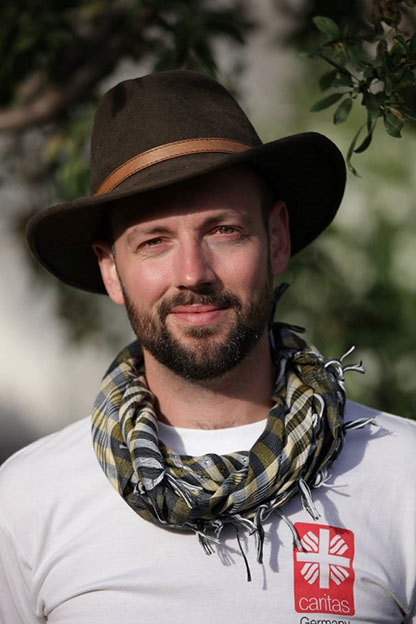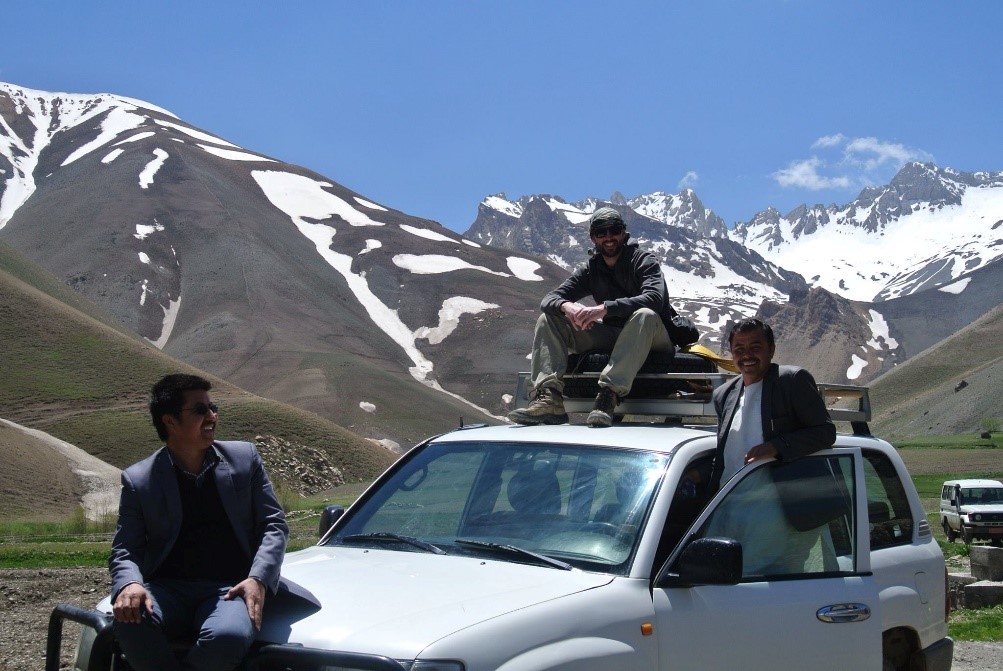
Alexander Pforte (MPP 2012)
Project Manager Relief
German Red Cross
I recently joined the German Red Cross in Iraq as the Project Manager Relief; previously I was the Program Coordinator and Deputy Country Representative for a German humanitarian Non-governmental organisation (NGO) in Afghanistan. My motivation for work is primarily intrinsic. I feel happiest when I know that my career is in the service of some of the world’s most vulnerable people – I believe strongly in humanitarian values and hope my efforts will make a difference.
[ALUMNI-INFO TEXT="As my responsibility entails continuously monitoring and measuring the impact of my work, I know that my work has helped communities survive winters, improve their resilience to disasters, and offered them new means of making a living. A good example of this was a 3-year LRRD (Linking Relief to Rehabilitation and Development) project funded by the EU. During that project, selected communities in the remote Central Highlands region of Afghanistan were provided training on improved agricultural techniques and supplied with better performing crop varieties, in order to reduce the gaps in their food supply. Other measures also included providing food aid to needy families that needed it, as well as engaging community members in food for work schemes that supported the development of public infrastructure such as protection walls near rivers.
The biggest challenge I face at work is security, especially since humanitarian principles and humanitarian law have constantly been eroded over the last decade or two. There are countless examples of this, including the bombardment of hospitals and other civilian targets in Afghanistan, Syria, Iraq, and Yemen; or the abduction and targeted killing of humanitarian aid workers in these countries by parties to the various conflicts. Cases like this would have been close to unthinkable a decade or two ago and would have resulted in much greater public and international condemnation than is the case today.
The second largest challenge is funding, particularly in the current political climate of populism and nationalism. The challenges are met with careful planning, advocacy, and persistence. It’s difficult to give specific examples, but in general, humanitarian organisations increasingly have to state their case with governments to receive funding that a few years ago would have been dispensed without question. Humanitarian values are increasingly being questioned as societies look inward, and organisations need to go to great lengths to make a case for how foreign and domestic policy are inextricably linked, while simultaneously professionalising the way in which they account for the funds they do receive and also constantly striving to do more with less."][/ALUMNI-INFO]

As someone who has grown up internationally, my ties to my native country, Germany, are not strong enough to make me feel out of place no matter where I live and work. Instead, I often ask myself – where is home? I’ve yet to come to that answer, but I do enjoy embracing and immersing myself in new cultures. New foods and customs are a recurring adventure I don’t want to miss. Those are the good stuff though, and there are still hardships that most people don’t tell you about. Apart from the restrictions placed on my personal life in the interest of security, I have to make do with poor infrastructure, electricity cuts that can sometimes last days, limited access to goods and services, as well as the absence of other general comforts that we take for granted in other parts of the world. All these take a toll on my personal wellbeing. Luckily, I have been very fortunate to have employers that provide me with regular R&R (rest and recreation), meaning that I take frequent breaks of one to two weeks outside of the country to recuperate.
[ALUMNI-QUOTES TEXT="Another real challenge in work is the stigma against foreigners. Afghans, in general, are both weary and suspicious of foreigners, the stigma being that they tend to be wealthy expats getting richer while trampling on local customs, or otherwise somehow involved in the conflict that is causing Afghans so much hardship. There is no silver bullet to addressing this distrust, but I find that respecting local culture and customs, making an effort to learn the language, and making use of every opportunity to mingle with Afghans goes a long way in overcoming the stereotypes that they have against foreigners. Admittedly, Germany and Afghanistan share a special relationship, because Germany was one of the first countries to recognise Afghanistan’s independence and sovereignty (long before the war ever broke out) and subsequently has provided decades of support and development aid. As such, Afghans tended to be much more welcoming once they find out I am a German, an advantage American or British people would certainly not have enjoyed.
My experience at the LKY School was largely positive, and it sharpened the analytical skills I now use on a daily basis. Beyond the skills that I gained at the LKY School, the reputation of the school has enhanced the value of my degree and earned me recognition beyond the content of my studies alone. While the school may not have contributed much in terms of my understanding of Asian culture (I had previously lived 8 years in Asia before embarking on my degree at the school), and the specific content of the degree with regard to the topics covered has little to do with the work I now do, I would probably not have ended up in Afghanistan if it had not been for the school. This is because the school goes to great lengths to invite prominent speakers and practitioners to speak at the school. These talks can inspire students."][/ALUMNI-QUOTES]
Personally, I was moved by a talk given by the Head of the UNDP in Afghanistan at the time, Peter Dalglish, who made an emphatic case for students to explore careers outside the private and government sectors. He urged us to consider pursuing careers in the not-for-profit sector, arguing that although the paycheck may be smaller, the added value for society is immeasurably larger. So far, in my experience, that message has proven to be true.